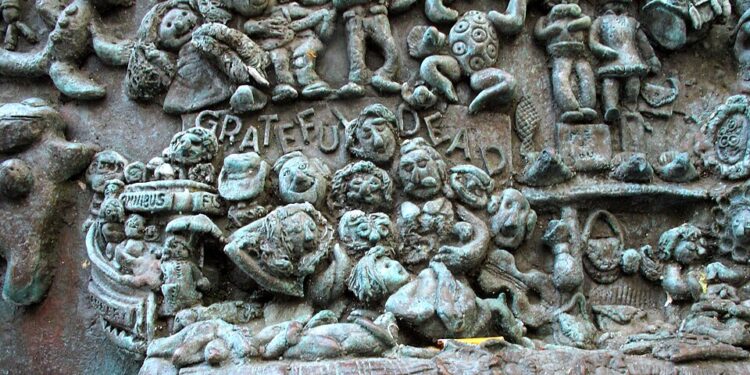We are witnessing the evolution of the music business. Artists from the 1950s went away. That was a fact of life. When the artist passed on, so did the creation of any new music. That was it.
This is not the case for artists from the ‘60s and ‘70s. What we are seeing is the future of the music industry taking shape.
The music industry is probably, outside of print media, the business most affected by the development of the internet. When Napster came along, everything changed. My mind still has trouble wrapping its little tendrils around the fact that every song ever recorded is available to be heard in my pocket at any time.
These days, labels are challenged, and artists make money from tours and merch, not record sales, and barely survive from streaming numbers. Within that model of tours and merch, we can see the impetus for the perpetuation of the band as brand.
Pioneered by the Grateful Dead
Of course, this model is being pioneered by the Grateful Dead.
The Dead have been pioneers for everything in music. They created community unlike any other band. They pushed merch, both legal and underground, better than anyone.
They pushed for taping and distribution of shows to foster their community and act as a marketing vehicle on their behalf. They laid the blueprint for bands like my favourite, Pearl Jam.
The Dead were the model of DIY that punk adopted without having the reverence for the source.
Now the Dead are playing as Dead and Co, with a series of shows at the Sphere called Dead Forever.
Surviving past the artists’ lifetime
It has been said that John Mayer and the rest of the band may continue to play as Dead and Co. long after Bobby, Billy and Mickey are gone. They love the music, and the fans love the music, and the music in some ways transcends the artists.
The band created a brand that can still survive long past the artists’ lifetimes, especially with technology and a location like the Sphere where the music takes center stage more than the individual members of the band.
I listened to an interview with Billy Corgan of Smashing Pumpkins, where he talked about his kids bearing the name Smashing Pumpkins as they get older, playing whatever they want under that moniker.
This set off the light bulb in my head that more and more, a band can be a brand, and the ideals of the music itself can survive the artists who created it.
Perpetuate the best ideas
This is a model the record industry could adopt. After all, we joke that there are no new ideas left, so why not perpetuate the best ones that we’ve already created? It can grow and evolve, but still remind us why we loved it in the first place.
Of course, many of those ‘60s artists have tried to keep going and have been unsuccessful. Bands like Lynyrd Skynyrd and Styx have toured for years with only one remaining member of the band, relegated to state fairs and corporate events.
Maybe they lacked the community and the brand strength, or maybe they simply were stuck in time.
But The Dead embraced technology, and Billy Corgan is trying to embrace an ideal without being stuck in time. There’s a difference there, one to note.
The music industry is changing, and someone is going to take this idea and run far past the current state of the biz. I can’t wait.
This story was first published by MediaPost.com and is republished with the permission of the author.

Cory Treffiletti is chief marketing officer at generative AI-powered product placement platform, Rembrand. He was previously SVP at FIS. He has been a thought leader, executive and business driver in the digital media landscape since 1994. In addition to authoring a weekly column on digital media, advertising and marketing since 2000 for MediaPost‘s Online Spin, Treffiletti has been a successful executive, media expert and/or founding team member for a number of companies, and published a book, Internet Ad Pioneers, in 2012.















